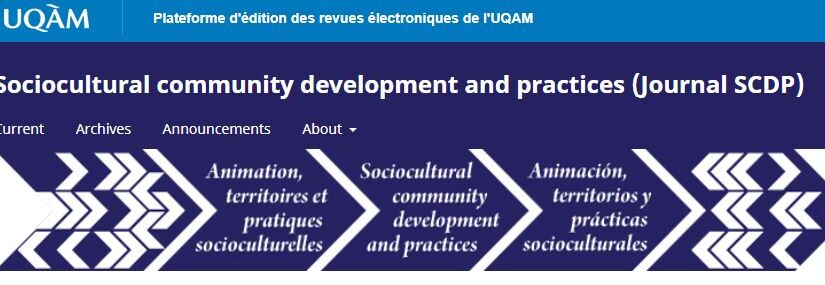Issue 17 (Summer 2020): Arts and sociocultural community development
The 17th Issue of Sociocultural Community Development and Practices was just released earlier this month. You can access it in English, French, and Spanish here.
Analyses
The « Enquête quantitative sur les dispositifs de médiation numérique dans les arts de la scène au Québec », conducted in 2019 by a team gathered around Marie-Claude Lapointe with 164 organizations active in the production and distribution of theatre, dance and circus, In particular, reveals their weak commitment to the digital component of their cultural mediation system. Despite an enviable presence in social networks, most still do not hire a manager, have not developed a digital strategy and rarely evaluated their actions, which may explain the agreed nature of the proposed activities. Thus, it appears that the potential offered by mediation tools, conventional or digital, and the exploitation that is made of them are still little exploited in the performing arts circles.
Health issues are at the heart of the most important programmes that Algerian institutions aim to disseminate in the community, especially breast cancer, which is widespread. Since the geographical distribution of the population between urban and rural areas affects the equitable distribution of awareness-raising and prevention activities, social intervention plays a key role in the implementation of these programmes. Based on statistical and descriptive analysis, the study lead by Chafik Ikoufane, « Social sensitization of breast cancer by the directorates of social activity »,, identifies ways to evaluate and improve existing outreach programs.
Beyi Wendgoudi Appolinaire examines, in « Le nouvel ordre de la communication et de la culture », the cultural normativity in the spaces of globalization imposed by the order of explicit and implicit interactions in the dynamics of the digital revolution. The analysis of the deployment of digital devices reveals a new communication order that replaces cultural diversity by standardized technological culture, calling into question inherited codes and social hierarchies. The dangers associated with this cultural reshaping call for a state regulation that is slow to be put in place, especially on the African continent.
Experiences
Communities of practice are established in a variety of workplaces to promote learning and knowledge sharing. Claude Champagne takes a reflective look at his work as a facilitator and accompanist for twelve years at the Forum of practitioners in social development in the city of Montreal. Drawing up a critical review of the strategies used, he questions, in his article « Partage de savoirs en développement social municipal », the sustainability of this initiative because the power relations between elected officials, managers and stakeholders (including facilitators) tend to hinder the development of a culture of innovation.
With the emergence of digital and transmedia culture, educommunication is taking root in the connected school, where the convergence of networks promotes a new model of interconnected learning based on interactivity, the author, critical analysis and decision-making in the face of the multiple inputs of data that reach us through cyberspace and collaborative work. For Mario Viché, who signs the text « Una cibereducación transmedia », this approach contributes to the development of digital wisdom and a profound change in the meaning of formation, learning and citizenship by promoting the appropriation of media languages through audiovisual production and media creation in the school environment.
The socio-cultural centres in France see added to their primary mission those of mediation, reception of migrant populations, prevention of delinquency and with them the need for intervention work that is no longer that of sociocultural community development in the original sense, but of unrecognized and unvalueded social work. Such a situation entails risks for these structures since external bodies impose conduct on them, often without consequential increases in resources. Thus, this mode of intervention on poverty and precariousness becomes an increasingly perilous exercise because of the risks of instrumentalisation and commodification. In his text « Les nouvelles missions des centres socioculturels au péril de l’animation », Louis Schalck cites as an example the recent evolution of the Centre social et culturel de Hautepierre in Strasbourg.
The next edition of the Review will have for theme « Research in sociocultural community development ». The deadline to submit an article or a report for this edition is October 2nd, 2020 (see instructions: www.atps.uqam.ca/auteurs_en.php). We also accept any time texts to appear in the open section.
Enjoy the reading!
Jean-Marie Lafortune
Editor

